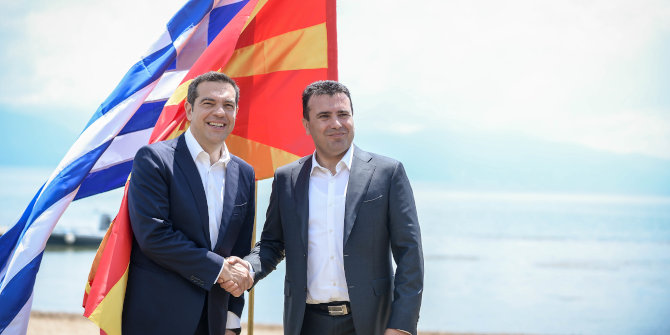 The Prespa Agreement resolving the long-running Macedonia name dispute between Athens and Skopje was ratified in the Greek parliament on 25 January. Nikolaos Tzifakis explains that with a majority of Greek citizens opposed to the agreement, the issue stands to have a significant impact on the Greek parliamentary elections due to be held later this year.
The Prespa Agreement resolving the long-running Macedonia name dispute between Athens and Skopje was ratified in the Greek parliament on 25 January. Nikolaos Tzifakis explains that with a majority of Greek citizens opposed to the agreement, the issue stands to have a significant impact on the Greek parliamentary elections due to be held later this year.
On 25 January, the Greek Parliament ratified the Prespa Agreement, ending the three decades long Athens-Skopje name dispute. The Former Yugoslav Republic of Macedonia is henceforth named ‘Republic of North Macedonia’, and its citizens are called ‘Macedonians/citizens of the Republic of North Macedonia’. The citizens of North Macedonia talk the ‘Macedonian’ language, which belongs (as the agreement explains) to the family of South Slavic languages.
Moreover, the two countries acknowledge that the terms ‘Macedonia’ and ‘Macedonian’ clearly point to different historical contexts and different cultural heritages. In this way, North Macedonia gets disassociated from the ancient Hellenic civilisation, developed in antiquity, in historical Macedonia. Lastly, North Macedonia revised its Constitution to ensure that the agreement is fully applied domestically, as well as to eliminate and/or revise all passages that could be taken to imply irredentist aspirations towards Greece.
The resolution of the name dispute is a major positive development in the Balkans, contributing to the consolidation of stability and the advancement of the region’s integration into the Euro-Atlantic structures. However, the way the Greek political system has dealt with the issue at hand has challenged the quality of democracy and the strength of societal cohesion in the country. Indeed, the resolution of the name dispute revealed a serious paradox.
While the overwhelming majority of Greek people (6 to 7 out of 10 according to different surveys) have firmly stood against any compromise on the matter, most political parties, including several of those which ultimately voted against the agreement (representing in total 9 out of 10 MPs in the current parliament), have been long pronouncing their support for a compromise solution with a composite name that would include a geographical qualifier to Macedonia. As a result, there is a clear discrepancy between the views of Greek society and the positions of its elected representatives.

Alexis Tsipras and Zoran Zaev following the signing the Prespa agreement (Public Domain)
The people’s uncompromising position on the name dispute can be explicated by reference to at least three main reasons. First of all, while the ‘Macedonian question’ has been on the agenda for almost three decades, there has never been any serious debate in the country to inform the people about what’s really at stake. Emotional arguments and historical self-evident accounts of the origins of Ancient Macedonia have masked any discussion about the nature of the dispute in modern times. Moreover, the decision in 2007 of most Greek political parties to move to a more conciliatory position, advocating their support for a compromise solution, has not been sufficiently explained to the people.
The second reason concerns the context of a decade-long economic crisis in which many people feel that they have already paid materially and symbolically a too heavy price. In this regard, the compromise in the name dispute has been seen by many frustrated people as adding insult to injury. The fact that the Euro-Atlantic partners of Greece have unequivocally supported the deal has unintentionally affirmed the perceptions of many people that the agreement serves international rather than Greek interests.
Last, but not least, while the discrepancy between the views of the people and of their elected representatives is well established, none of the main political parties has attempted to remedy it. On the contrary, the latter have used the resolution of the name dispute as an opportunity to adjust their electoral tactics and score points in view of the coming parliamentary elections. The entanglement of the name dispute with electoral considerations has contributed to the extreme polarisation of politics around the articulation of false “patriots-traitors” and “pragmatists-ultranationalists” dichotomies.
Moreover, the ratification of the Prespa Agreement just a few months ahead of national elections has presented individual MPs (coming from smaller parties that may not enter parliament again) with an opportunity to change party affiliation. As a result, some ANEL MPs gave a vote of confidence and/or voted in favour of the Prespa Agreement, while POTAMI witnessed the decision of a few of its MPs to fully support the positions either of New Democracy or SYRIZA.
In parliamentary democracies, the views of societies and of their representatives are usually realigned through elections. For Greece, the worst-case scenario would be that new and established ultranationalist forces and far right parties (e.g. Golden Dawn) capitalise on public discontent and increase their parliamentary influence. The maturity of the Greek political system and its readiness to deal with the implementation of the agreement and bring people’s day to day problems back to the top of the agenda will largely determine whether such a pessimistic scenario takes place.
Please read our comments policy before commenting.
Note: This article gives the views of the author, not the position of EUROPP – European Politics and Policy or the London School of Economics.
_________________________________
 Nikolaos Tzifakis – University of the Peloponnese
Nikolaos Tzifakis – University of the Peloponnese
Nikolaos Tzifakis is an Associate Professor in the Department of Political Science and International Relations at the University of the Peloponnese, Corinth (Greece). He is also a member of the Balkans in Europe Policy Advisory Group (BiEPAG).






The term Macedonia is a geographical term. There are no Macedonians who spoke Greek but lived on the periphery of the Greek world. Slavs who call themselves Macedonians and Albanians live in the north part of the ancient Kingdom, but they are not Macedonians. Greeks in the south, half of whose ancestors cam from Anatolia post-1923 and Constantinople. Before 1912 a majority in the south were non-Greek. They left or were expelled or murdered. Likewise with Thrace. There are no Thrace but East Thrace and Thrace exist. However Turks and Greeks live there. The answer is to make clear the name Macedonia is just a geographical term. The North ‘Macedonians’ admit this is the case and they have no connection to ancient Macedonia ethnically. The Greeks should be satisficed with this. It’s reality and the truth.
Peaonia, Dardania and Pelagonia (Northern Macedonia of today) were added to the kindom of Macedon later. The heart was just north of Olympus. “Slavomacedonians” did not speak Greek for sure. The ancient Kingdom of Macedon certainly did (either originally or after Hellenization). https://www.britannica.com/place/ancient-Greece/The-rise-of-Macedon
This is not quite the case. The (North) Macedonian’s official concept of their identity is that they are not entirely a Slavic people because the Slavs did not simply eliminate the people who’s land they settled in the 6th C, these lands were not empty, but they mixed, or assimilated, forming a new Macedonian people. They took the name of the land they were on and the people they assimilated, this is certainly not unusual behaviour.
It is hard to either prove or disprove this thesis, as it is also hard to ‘prove’ that modern Greeks bear any resemblance to the ancient Greeks, but no-one takes from the Greeks their idea of themselves. Neither should anyone take the right of Macedonians to identify as they wish… unless it can be categorically (and independently) proven to be wrong. The way I see all of this is that the Greek long term strategy of denying Macedonians an identity is because of the terrible crimes they committed in the region post 1913, and still they deny the existence of their Macedonian minority. The western democracies should have stood with Macedonia on principle rather than bulldozing it as they have done. This does not sit well in (North) Macedonia and could well lead to further trouble, which could have been avoided by simply telling Greece to behave according to international law.
The old kingdom lies entirely within Greece with the exception of Pelagonia. North Macedonia is Dardania for the most part and also old Paeonia. The propaganda of Skopje acamedy lacks basic geographical information. https://en.wikipedia.org/wiki/Paeonia_(kingdom)#/media/File:Map_of_ancient_Paeonia_and_environs_(English).svg
The claims of Skopje academy can be debunked quite easily. Northern Macedonia lies on ancient Dardania and Peaonia. Macedon was in the south with the exception of Pelagonia. Nothing needs to be proven. It is obvious. https://www.jatland.com/home/Paeonia https://en.wikipedia.org/wiki/Kingdom_of_Dardania https://en.wikipedia.org/wiki/Dardani https://en.wikipedia.org/wiki/Paeonians
Basic knowledge of history and geography prove the claims of Skopje academy wrong. The ancient kingdom-state lies entirely within Greece with the exception of Pelagonia. Most of the land of Northern Macedonia is upon old Paeonia and Dardania. https://en.wikipedia.org/wiki/Category:Paeonia_(kingdom) https://en.wikipedia.org/wiki/Kingdom_of_Dardania#/media/File:DardaniaMap.png